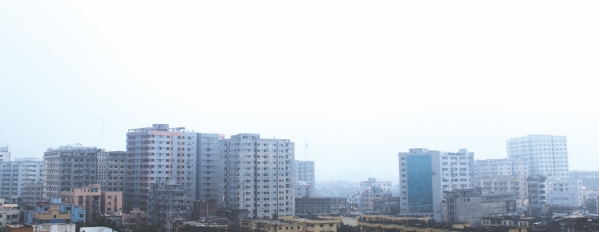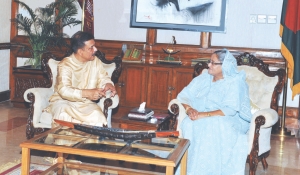| Home - Back Issues - The Team - Contact Us |
 |
| Volume 11 |Issue 22| June 01, 2012 | |
|
|
Business
A Questionable Development Bangladeshi businesses fear that recent memorandum of understanding signed between the government and the Sahara group might harm the country's real estate sector Naimul Karim Last week, for a moment, it seemed as though the owner of Sahara India Pariwar, Subrata Roy Sahara, came to Bangladesh disguised as the modern day 'Superman', aiming to solve the innumerable crises that the country has been going through. With his wide-scale investment-interests, especially in the housing industry— where he vows to build the 'perfect city' with adequate power and water supply— the Sahara chief, just for a split-second, gave the impression of a local politician, desperately trying to win the people's hearts. A seasoned operator, the 63-year-old business tycoon stated his 'ancestral relation' with the country as one of the reasons behind the proposed investments. By promising the people a 'complete lifestyle' through his real estate ventures and expressing his interest in the national cricket team, in a press conference last week, Subrata Roy, played all the right cards. Furthermore, he expressed his interest in working with the local housing companies in various projects. “We don't want to compete, but complement,” he said. However, despite the friendly attitude towards the local housing groups, several real estate entrepreneurs have stated their concern regarding the recent memorandum of understanding (MoU) signed between the government and the Sahara group.
“We are extremely worried. How can they sign an MoU with a foreign private company? Bangladeshi real estate companies have struggled to establish their business for the last 20 years. Now, if the government decides to give them the 100,000 acres of land for free, as per their request, it'll create an uneven platform for business,” explains, Nasrul Hamid, president, Real Estate and Housing Association of Bangladesh (Rehab). One of Sahara's projects, according to Subrata Roy, includes building a new city, around 25 kms away from Purbachal, for which they have asked the Bangladeshi government for free land. They plan to invest at least $100 million initially. The group claims that such a venture would be mutually beneficial, since the company plans to develop the region with their own money and later sell the apartments. Commenting on Sahara's proposed project, Hamid says, “We have been asking the government for land at a subsidised rate for a long time now. They can conduct a similar venture with Bangladeshi developers. We definitely are capable of doing the same.” Echoing Hamid's views, Toufiq M Seraj, Managing Director, Sheltech, states that local developers have invested close to Tk 50,000 crores in the housing industry, which is a lot more than the initial investment that Sahara group is willing to make. “Everybody has been complaining about the increasing land prices. If the government had sold plots to developers at cheaper rates, the prices of apartments in Dhaka would have been a lot less today,” he adds. Terming the recently signed MoU as uncalled for, KAM Harun, former chairman, Rajdhan Unnayan Kartripakkha (RAJUK), says “We don't need investment from abroad. We have a good number of housing companies in our country and we can do with them. Foreign companies are more than welcome to invest in the sectors that are struggling… the transport sector, for instance needs investment.” He adds that with Purbachal already being developed, building another city on the outskirts of Dhaka will leave no room for greenery. Economists claim that Sahara's project, if implemented, can put pressure on the country's financial balance since realtors would tend to take the profits from the sales outside the country. A similar scenario was witnessed in Thailand, in the 70s, after foreign real estate companies transferred their profits outside the country. Questions regarding the fate of the linkage industries that depend on the real estate sector have also been raised. Experts state that if the company is allowed to buy their raw materials from outside, then it could have a negative effect on the economy. Farhad Mazhar, a noted economist, has termed Sahara as a company interested in 'land speculation' and believes that their arrival won't bring any economic benefit. “Those companies who don't want workers to benefit, or help the economy, technology or aim for employment generation are speculators. They go to different countries and buy land and wait for the land price to increase. That covers their losses. Sahara might do the same,” he says. He further adds that the very fact that the prime minister actually signed a MoU with the private company is in itself a snub to the business community of the country. The wide-range of assumptions made by realtors and economists is solely due to the fact that a clear picture of the MoU is still unavailable. While Subrata Roy might have announced his plans in a press conference last week, nothing specific can be said as long as Sahara doesn't send in a detailed proposal of their plans. Sk Abdul Mannan, planning department, RAJUK, says that there is still a long way to go before Sahara can enter the country's business sector. “This isn't a contract, it's just an MoU. There are still many more stages that are yet to come. If a foreign company wants to come and work here, there are lots of processes that it needs to go through and it also needs to follow various laws,” he says. Apart from the housing industry, Subrata Roy, also expressed his desire to enter the tourism business in Bangladesh. Reports published, suggest that Roy wants to initiate a project in the Sunderbans, a task that he failed to do in India, due to opposition from environmentalists. The Daily Star, in a report, quoted him saying, “That project can be initiated here as the larger part of the Sunderbans fall in Bangladesh.” A brief glance into the Sunderbans tourism project plan proposed by Sahara in India, explains the reasons behind it getting banned. Reports published regarding the mega tourism project, state that the company wanted to build mini-golf courses, helipads, introduce water sports and make several other changes which would have badly affected the world heritage site. Environmentalists say that projects like these would destroy the evergreen site. “We obviously will protest against the implementation of such projects. It's obviously against the law. The Sunderbans are our pride. It'll be catastrophe if foreign investors go there and build tourism sites. If it's not allowed in India, how can it be allowed in Bangladesh? Are we just a dumping ground?” exclaims, MA Matin, General Secretary, Paribesh Bachao Andolon. Reiterating Matin's views, Executive Director of the Bangladesh Environmental Lawyers Association, Rezwana Hasan feels that the lack of law-enforcement in Bangladesh attracts foreign investors. “We have laws that protect the Sunderbans, but unfortunately they're not always complied with. Why else would Sahara leave their home country and come to invest here?” she says. While the deal with Sahara might still be in its budding stages, it needs to be carefully addressed. The very fact that the company has appointed a relative of the prime minister to head its campaign in the country and that the government is even considering to provide such a large amount of land to Sahara, poses serious questions. As, Rehab President, Nasrul Hamid puts it, “In a country where people struggle to get 5 acres of land, it's amazing how the government can even think about providing a foreign company with a 100,000 acre of it.”
|
||||
Copyright
(R) thedailystar.net 2012 |

